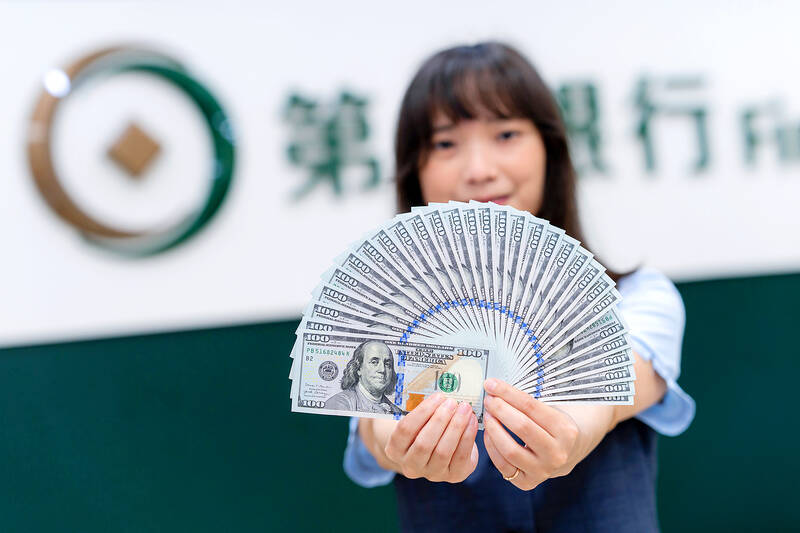The US dollar yesterday continued its upward momentum against the New Taiwan dollar, hitting a more than three-year high against the local currency on expectations that the US Federal Reserve would continue to aggressively raise interest rates.
The US dollar closed up NT$0.163 at NT$31.293, its highest since Sept. 4, 2019.
The greenback attracted strong buying soon after the local foreign exchange market opened as investors rushed to pick up the currency, betting that the Fed would act aggressively in a policymaking meeting scheduled for Tuesday and Wednesday next week, dealers said.

Photo: Chen Mei-ying, Taipei Times
The weakness of other regional currencies, including the yen, which fell to a new 24-year low, and the yuan, which breached the psychologically important 7 yuan per US dollar level, added more downward pressure on the NT dollar, dealers said.
Investors have been scrambling to move their funds out of Asia and into US dollar-denominated assets to take advantage of their higher interest rate yields, leading to the depreciation of global currencies against the greenback.
Expectations that the Fed would raise interest rates even higher next week were fueled after a higher-than-expected inflation report released on Tuesday and a stronger-than-expected retail sales report for last month released on Thursday, dealers said.
Over the week, the US dollar rose NT$0.398, or 1.3 percent, against the NT dollar, the eighth consecutive week of appreciation against the local currency.
Taiwan’s central bank appeared reluctant to intervene in the market to shore up the NT dollar because it was unlikely it could reverse the tide amid fund outflows, dealers said.
Some analysts believe that the US dollar trading above NT$31 would become a new normal and that the greenback could challenge NT$31.50 soon.
Taiwan Association of Machinery Industry chairman Larry Wei (魏燦文) said that if the US dollar were to rise further to above NT$32, it would help Taiwanese machinery exporters stay competitive against their Japanese competitors, who have benefited from a weakening yen.
Compared with a more than 11.6 percent drop in the NT dollar against the US dollar so far this year, the yen has tumbled about 25.8 percent, the association said, adding that the weakness of the Japanese currency has hurt the competitiveness of Taiwan’s machinery suppliers.

With an approval rating of just two percent, Peruvian President Dina Boluarte might be the world’s most unpopular leader, according to pollsters. Protests greeted her rise to power 29 months ago, and have marked her entire term — joined by assorted scandals, investigations, controversies and a surge in gang violence. The 63-year-old is the target of a dozen probes, including for her alleged failure to declare gifts of luxury jewels and watches, a scandal inevitably dubbed “Rolexgate.” She is also under the microscope for a two-week undeclared absence for nose surgery — which she insists was medical, not cosmetic — and is

GROWING CONCERN: Some senior Trump administration officials opposed the UAE expansion over fears that another TSMC project could jeopardize its US investment Taiwan Semiconductor Manufacturing Co (TSMC, 台積電) is evaluating building an advanced production facility in the United Arab Emirates (UAE) and has discussed the possibility with officials in US President Donald Trump’s administration, people familiar with the matter said, in a potentially major bet on the Middle East that would only come to fruition with Washington’s approval. The company has had multiple meetings in the past few months with US Special Envoy to the Middle East Steve Witkoff and officials from MGX, an influential investment vehicle overseen by the UAE president’s brother, the people said. The conversations are a continuation of talks that

CAUTIOUS RECOVERY: While the manufacturing sector returned to growth amid the US-China trade truce, firms remain wary as uncertainty clouds the outlook, the CIER said The local manufacturing sector returned to expansion last month, as the official purchasing managers’ index (PMI) rose 2.1 points to 51.0, driven by a temporary easing in US-China trade tensions, the Chung-Hua Institution for Economic Research (CIER, 中華經濟研究院) said yesterday. The PMI gauges the health of the manufacturing industry, with readings above 50 indicating expansion and those below 50 signaling contraction. “Firms are not as pessimistic as they were in April, but they remain far from optimistic,” CIER president Lien Hsien-ming (連賢明) said at a news conference. The full impact of US tariff decisions is unlikely to become clear until later this month

Nintendo Co hopes to match the runaway success of the Switch when its leveled-up new console hits shelves on Thursday, with strong early sales expected despite the gadget’s high price. Featuring a bigger screen and more processing power, the Switch 2 is an upgrade to its predecessor, which has sold 152 million units since launching in 2017 — making it the third-best-selling video game console of all time. However, despite buzz among fans and robust demand for pre-orders, headwinds for Nintendo include uncertainty over US trade tariffs and whether enough people are willing to shell out. The Switch 2 “is priced relatively high”